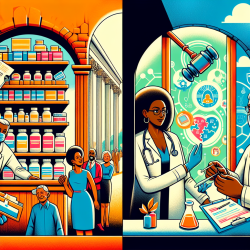Introduction
In the ever-evolving landscape of healthcare, it's crucial for practitioners to adapt and embrace innovative approaches that cater to the complex challenges of the 21st century. The research article, "It's time to take a sustainable approach to health care in the face of the challenges of the 21st century," provides valuable insights into how interdisciplinary and intersectoral collaborations can enhance health outcomes. In this blog, we will explore the key takeaways from this research and how practitioners can implement these findings to improve their skills and create better outcomes for children.
The Need for Interdisciplinary Approaches
The research highlights the importance of moving beyond traditional healthcare models to embrace interdisciplinary approaches. This shift is essential due to the increasing complexity of health issues, such as multimorbidity and the impact of environmental factors on health. By integrating various disciplines, practitioners can address the multifactorial nature of health challenges more effectively.
Implementing One Health Principles
One Health is a holistic approach that recognizes the interconnectedness of human, animal, and environmental health. By adopting One Health principles, practitioners can better understand the broader context of health issues and develop comprehensive strategies for prevention and intervention. This approach is particularly relevant in addressing challenges like climate change, globalization, and ageing populations.
Fostering Sustainable Health
Sustainable Health (SH) is a concept that emphasizes the maintenance of physical, psychological, and social well-being throughout life. Practitioners can promote SH by creating environments enriched with quality resources and ensuring social and gender fairness. This involves collaborating with various stakeholders, including researchers, health systems, communities, and individuals, to develop adaptable and flexible solutions.
Encouraging Intersectoral Collaboration
Intersectoral collaboration is key to addressing the complex health challenges of today. By partnering with other sectors, such as education, community organizations, and government agencies, practitioners can develop research projects that are tailored to the real needs of communities. These collaborations can lead to innovative solutions that are applicable across different sectors and regions.
Conclusion
As healthcare professionals, it's essential to embrace interdisciplinary and intersectoral approaches to address the multifaceted challenges of the 21st century. By implementing the principles of One Health and Sustainable Health, practitioners can enhance their skills and create better outcomes for children and communities. To further explore these concepts, I encourage you to delve into the original research paper, It's time to take a sustainable approach to health care in the face of the challenges of the 21st century.










